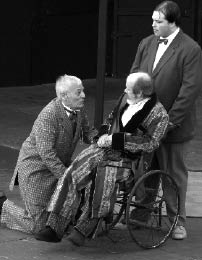All's Well That Ends Well
by Anthony Chase

Shakespeare’s All’s Well That Ends Well presents a number of production challenges. Directed by Derek Campbell, the version currently running in Delaware Park conquers some of these, while side-stepping others. The result is an agreeable production that sprawls out over two and a half hours, but moves smartly through its hurdles.
Comedy characteristically takes absurd premises to their logical conclusions. This play, however, forces a possible premise to an absurd conclusion.
Helena, the daughter of a great physician, is ward to the Countess of Roussillon and in love with her son, Bertram. When Helena learns that the king has fallen seriously ill and that his own physicians have given up hope, she devises a plan. She will use the remedies she has inherited from her father to cure the king, and as her reward she will request Bertram for her husband.
This turns out to be a very bad idea.
Helena cures the king, but Bertram is appalled at the idea of marrying a commoner. After the forced marriage, he flees the court, taunting manipulative Helena with a note stating that he will never be a proper husband to her until she has gotten the ring from his finger and is pregnant with his child—two events that will never ever happen!
Without regurgitating more of the convoluted and far-fetched plot, let it suffice to say that all’s well that ends well, no matter how improbably.
The major challenge of the play is to make Helena’s pathological desire for Bertram palatable, while at the same time, making the loving resolution plausible. In the world of the play, Bertram is perceived to be the unsympathetic character. The Shakespeare in Delaware Park production glosses over the problems, striving instead for a steady and articulate rendering of the play. This seems a wise choice, as the park itself imposes some challenges with its diffuse playing area, which, despite excellent amplification, swallows any subtlety of interpretation.
Kate LoConti is spirited and charming as Helena and that is enough. Andy Moss is engaging as Bertram and keeps his smarminess to a minimum.
Tom Loughlin exhibits some marvelous clowning as Bertram’s disreputable comrade, Parolles. That the subplot involving his character drags the play down is not the fault of his performance, which is feisty and fun. Indeed, the clowning is among the superior aspects of this production. The entire sequence waylays the action, though it does, with echoes of Malvolio, demonstrate the Elizabethan taste for torture as entertainment.
Beth Donohue employs her resonant voice and perfect diction as the mother of Diana, played with great charm and humor by Rebecca Elkin. Robert Rutland and Lisa Ludwig give confident performances as the king and countess.
Like last year’s Theater for a New Audience production in New York City, this All’s Well That Ends Well has been given an Edwardian setting, lending it a certain ordered elegance. Ken Shaw designed the costumes and props.
|
Issue Navigation> Issue Index > v6n26: Recycle Your Cash (6/28/07) > All's Well That Ends Well This Week's Issue • Artvoice Daily • Artvoice TV • Events Calendar • Classifieds |









 Current Issue
Current Issue